21. Kinh Pháp Cú – Chương 21: Phẩm Tạp Lục – Miscellaneous – Song ngữ
Dhammapada Sutta (The Path of Truth)
Kinh Pháp Cú
English: Bhikkhu Khantipalo & Sister Susanna, 1993
Vietnamese: Thích Minh Châu, 1996
Illustrated Photos: Venerable-mahasi-sayadaw
Compile: Lotus group
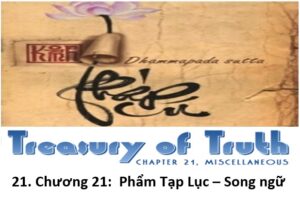
Chapter 21: Pakinnaka – Miscellaneous (Verse 290-305)
21. Kinh Pháp Cú – Chương 21: Giảng Lược Phẩm Tạp Lục – Song ngữ
Verse 290. Give Up A Little, Achieve Much
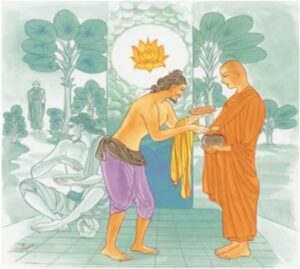
If one should see great happiness
in giving up small happiness
one wise the lesser would renounce
the greater full-discerning.
“Nhờ từ bỏ lạc nhỏ,
Thấy được lạc lớn hơn,
Bậc trí bỏ lạc nhỏ,
Thấy được lạc lớn hơn.”
Explanation:
If by renouncing a lesser happiness one may realize a greater happiness, let the wise man renounce the lesser, having regard for the greater.
- Nếu bỏ vui nhỏ mà được vui lớn, kẻ trí sẽ làm như thế.
Verse 291. When Anger Does Not Abate
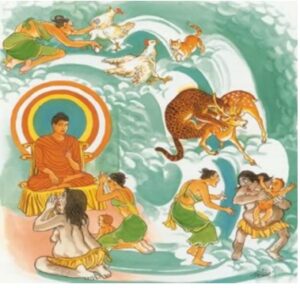
Who so for self wants happiness
by causing others pain,
entangled in anger’s tangles
one’s from anger never free.
“Gieo khổ đau cho người,
Mong cầu lạc cho mình,
Bị hận thù buộc ràng
Không sao thoát hận thù.”
Explanation:
Entangled by the bonds of hate, he who seeks his own happiness by inflicting pain on others, is never delivered from hatred.
- Gieo khổ cho người để cầu vui cho mình, thì sẽ bị lòng sân hận buộc ràng, không sao thoát khỏi nỗi oán ghét.
Verse 292. How Blemishes Increase

What should be done is left undone
and done is what should not be done,
ever the pollutions grow
of those ones proud and heedless.
“Việc đáng làm, không làm,
Không đáng làm, lại làm,
Người ngạo mạn, phóng dật,
Lậu hoặc ắt tăng trưởng.”
Explanation:
The cankers only increase for those who are arrogant and heedless, who leave undone what should be done and do what should not be done.
- Việc đáng làm không làm, việc không đáng làm lại làm, những người phóng túng ngạo mạn, thì lậu tập mãi tăng thêm.
Verse 293. Mindfulness Of Physical Reality
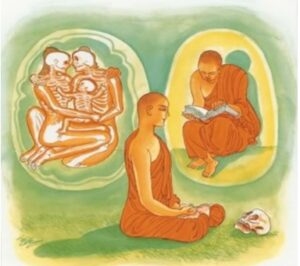
But for who always practice well
bodily mindfulness,
do never what should not be done,
for mindful ones, the full-aware,
pollutions fade away.
“Người siêng năng cần mẫn,
Thường thường quán thân niệm,
Không làm việc không đáng,
Gắng làm việc đáng làm,
Người tư niệm giác tỉnh,
Lậu hoặc được tiêu trừ.”
Explanation:
The cankers cease for those mindful and clearly comprehending ones who always earnestly practise mindfulness of the body, who do not resort to what should not be done, and steadfastly pursue what should be done.
- Thường quan sát tự thân, không làm việc không đáng, việc đáng gắng chuyên làm, thì lậu tập [29] dần tiêu tan.
Verse 294. The Destroyer Who Reaches Nibbana

One’s mother and father having slain
and then two warrior kings,
a realm as well its treasurer,
one goes immune, a Brahmin True.
“Sau khi giết mẹ cha (1),
Giết hai Vua Sát lỵ (2),
Giết vương quốc, quần thần (3)
Vô ưu, Phạm chí sống.”
Explanation:
Having slain mother (craving), father (self-conceit), two warrior kings (eternalism and nihilism), and destroyed a country (sense organs and sense objects) together with its treasurer (attachment and lust), ungrieving goes the holy man.
- Hãy diệt mẹ [30] (ái dục) và cha [31] (kiêu căng), diệt hai vua dòng Sát đế lợi [32], diệt vương quốc [33] luôn cả quần thần [34], mà hướng về Bà la môn vô ưu [35].
Verse 295. The ‘Killer’ Who Goes Free
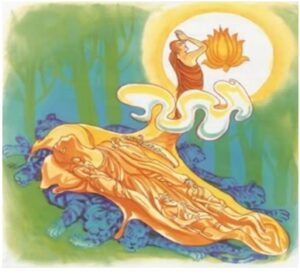
One’s mother and father having slain
and then two learned kings,
as well the fifth, a tiger fierce,
one goes immune, a Brahmin True.
“Sau khi giết mẹ cha,
Hai vua Bà-la-môn,
Giết hổ tướng thứ năm (4)
Vô ưu, Phạm chí sống.”
Explanation:
Having slain mother, father, two brahmin kings (two extreme views), and a tiger as the fifth (the five mental hindrances), ungrieving goes the holy man.
- Hãy diệt mẹ (ái dục) và cha (kiêu căng), diệt hai vua dòng Bà la môn, diệt luôn hổ tướng “nghi” thứ năm, mà hướng về Bà la môn vô ưu.
Verse 296. Reflect On The Virtues Of The Buddha
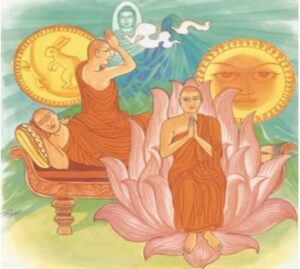
Well awakened, they’re awake
ever the Buddha’s pupils
who constantly by day, by night
are mindful of the Buddha.
“Ðệ tử Gotama,
Luôn luôn tự tỉnh giác
Vô luận ngày hay đêm,
Thường tưởng niệm Phật Ðà.”
Explanation:
Those disciples of Gotama ever awaken happily who day and night constantly practise the Recollection of the Qualities of the Buddha.
- Đệ tử Kiều đáp ma [36], phải luôn tự tỉnh giác, vô luận ngày hay đêm, thường niệm tưởng Phật đà.
Verse 297. Reflect On The Virtues Of The Dhamma

Well awakened, they’re awake
ever the Buddha’s pupils
who constantly by day, by night
are mindful of the Dhamma.
“Ðệ tử Gotama,
Luôn luôn tự tỉnh giác,
Vô luận ngày hay đêm,
Thường tưởng niệm Chánh Pháp.”
Explanation:
Those disciples of Gotama ever awaken happily who day and night constantly practise the Recollection of the Qualities of the Dhamma.
- Đệ tử Kiều đáp ma, phải luôn tự tỉnh giác, vô luận ngày hay đêm, thường niệm tưởng Đạt ma.
Verse 298. Reflect On The Virtues Of The Sangha
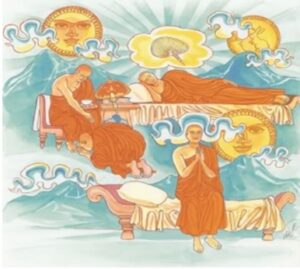
Well awakened, they’re awake
ever the Buddha’s pupils
who constantly by day, by night
are mindful of the Sangha.
“Ðệ tử Gotama,
Luôn luôn tự tỉnh giác,
Vô luận ngày hay đêm,
Thường tưởng niệm Tăng già.”
Explanation:
Those disciples of Gotama ever awaken happily who day and night constantly practise the Recollection of the Qualities of the Sangha.
- Đệ tử Kiều đáp ma, phải luôn tự tỉnh giác, vô luận ngày hay đêm, thường niệm tưởng Tăng già.
Verse 299. Reflect On The Real Nature of the Body
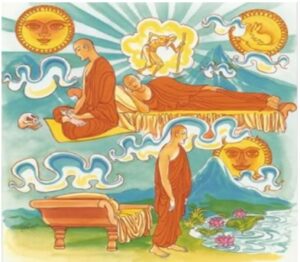
Well awakened, they’re awake
ever the Buddha’s pupils
who constantly by day, by night
are mindful of the body.
“Ðệ tử Gotama,
Luôn luôn tự tỉnh giác,
Vô luận ngày hay đêm,
Thường tưởng niệm sắc thân.”
Explanation:
Those disciples of Gotama ever awaken happily who day and night constantly practise mindfulness of the body.
- Đệ tử Kiều đáp ma, phải luôn tự tỉnh giác, vô luận ngày hay đêm, thường niệm tưởng sắc than [37].
Verse 300. Reflect On Harmlessness
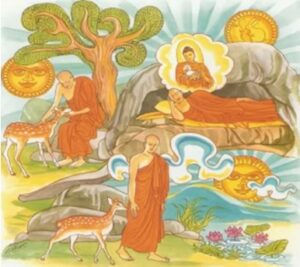
Well awakened, they’re awake
ever the Buddha’s pupils
who constantly by day, by night
in harmlessness delight.
“Ðệ tử Gotama,
Luôn luôn tự tỉnh giác,
Vô luận ngày hay đêm,
Ý vui niềm bất hại.”
Explanation:
Those disciples of Gotama ever awaken happily whose minds by day and night delight in the practice of non-violence.
- Đệ tử Kiều đáp ma, phải luôn tự tỉnh giác, vô luận ngày hay đêm, thường vui điều bất sát.
Verse 301. The Mind That Takes Delight in Meditation
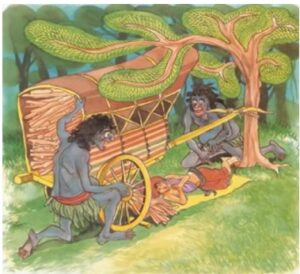
Well awakened, they’re awake
ever the Buddha’s pupils
who constantly by day, by night
in meditation take delight.
“Ðệ tử Gotama,
Luôn luôn tự tỉnh giác,
Vô luận ngày hay đêm,
Ý vui tu thiền quán.”
Explanation:
Those disciples of Gotama ever awaken happily whose minds by day and night delight in the practice of meditation.
- Đệ tử Kiều đáp ma, phải luôn tự tỉnh giác, vô luận ngày hay đêm, thường ưa tu Thiền quán.
Verse 302. Samsara – Journey
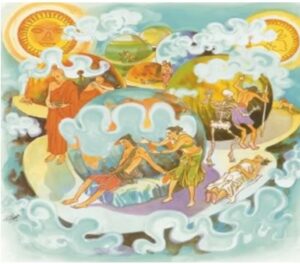
Hard’s the going-forth, hard to delight in it,
hard the household life and dukkha is it too.
Dukkha’s to dwell with those dissimilar
and dukkha befalls the wanderer.
Be therefore not a wanderer,
not one whom dukkha befalls.
“Vui hạnh xuất gia khó,
Tại gia sinh hoạt khó,
Sống bạn không đồng, khổ,
Trôi lăn luân hồi, khổ,
Vậy chớ sống luân hồi,
Chớ chạy theo đau khổ.”
Explanation:
Difficult is life as a monk; difficult is it to delight therein. Also difficult and sorrowful is household life. Suffering comes from association with unequals; suffering comes from wandering in samsara. Therefore, be not an aimless wanderer, be not a pursuer of suffering.
- Xuất gia dứt hết ái dục là khó, tại gia theo đường sinh hoạt là khó, không phải bạn mà chung ở là khổ, qua lại trong vòng luân hồi là khổ. Vậy các ngươi đừng qua lại trong vòng sanh tử luân hồi ấy.
Verse 303. He Is Honoured Everywhere
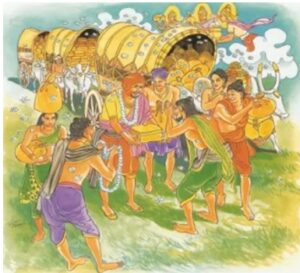
Who’s full of faith and virtue,
of substance, high repute,
is honoured everywhere,
wherever that one goes.
“Tín tâm, sống giới hạnh
Ðủ danh xưng tài sản,
Chỗ nào người ấy đến,
Chỗ ấy được cung kính.”
Explanation:
He who is full of faith and virtue, and possesses good repute and wealth – he is respected everywhere, in whatever land he travels.
- Chánh tín và giới hạnh, được danh dự và thánh tài [38]; người nào được như thế, đến đâu cũng tôn vinh.
Verse 304. The Virtuous Are Seen
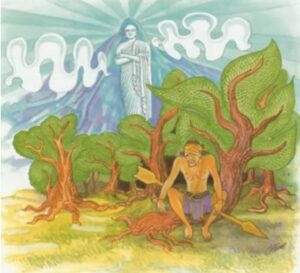
Afar the true are manifest
like Himalayan range,
yet even here the false aren’t seen,
they’re arrows shot by night.
“Người lành dầu ở xa
Sáng tỏ như núi tuyết,
Người ác dầu ở gần
Như tên bắn đêm đen.”
Explanation:
The good shine even from afar, like the Himalaya mountain. But the wicked are unseen, like arrows shot in the night.
- Làm lành thì danh được vang xa, tỏ rạng như Tuyết sơn; làm ác thì mù mịt như bắn cung ban đêm.
Verse 305. Discipline Yourself In Solitude
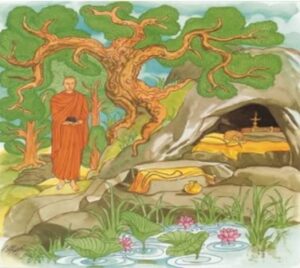
Alone one sits, alone one lies,
alone one walks unweariedly,
in solitude one tames oneself
so in the woods will one delight.
“Ai ngồi nằm một mình.
Ðộc hành không buồn chán,
Tự điều phục một mình
Sống thoải mái rừng sâu.”
Explanation:
He who sits alone, sleeps alone and walks alone, who is strenuous and subdues himself alone, will find delight in the solitude of the forest.
- Ngồi một mình, nằm một mình, đi một mình không mệt mỏi, một mình tự điều luyện, vui trong chốn rừng sâu.
Chú thích:
[29] Lậu tập: lậu nghĩa đen là rơi rớt từng giọt nhỏ xuống. Nghĩa bóng là chỉ cho những thứ phiền não cấu nhiễm. Chữ tập là nhóm hợp, là thói quen. Những hành động làm đi làm lại nhiều lần thành ra quen thuộc, gọi là tập. Lậu tập là những thói quen cấu nhiễm xấu ác do những thứ phiền não kết hợp tác động gây nên.
[30] Mẹ – Mata, tiêu biểu tâm ái dục (tanha ), vì chính ái dục dẫn dắt chúng sanh đi tái sanh.
[31] Cha – Pita, tiêu biểu tánh ngã mạn, chấp cái ta, và tự phụ, kiêu căng
[32] Diệt hai giòng Sát đế lợi: dụ cho hai phái ngoại đạo thời Phật là Thường kiến và Đoạn kiến.
[33] Diệt Vương quốc: chỉ cho 12 xứ: lục căn và lục trần.
[34] Quần thần: chỉ sự dục lạc (nadirago)
[35] Bà la môn vô ưu: chỉ quả vị lậu tận A la hán.
[36] Kiều Đáp Ma: ( Gotama) chỉ cho đức Phật.
[37] Niệm tưởng sắc thân: Quán thân bất tịnh gồm có 32 thứ: tóc, lông, móng, răng, da, thịt xương, gân v.v…
[38] Thánh tài: nói đủ là thất thánh tài, tứ gia tài của bậc thánh giả. Thất thánh tài gồm có: tín, giới, tàm, quý, văn, xả, huệ.

Sources:
Tài liệu tham khảo:
- http://thanhtruc-thanhtrucgdth.blogspot.com/2011/02/kinh-phap-cu.html
- http://www.buddhanet.net/dhammapada/d_misc.htm
- https://www.pinterest.com/travelqueen15/funny-memese-cards/
- Tam Tu Metta Buddhist Temple & Heritage Garden – 610 Fisher Ave, Morgan Hill, CA 95037
- https://quangduc.com/a29858/kinh-phap-cu-chu-giai-tap-3
